|

75th
Annual GW Law Review Symposium | Gore,
Alito to visit GW Law | Cohen
& Cohen Mock Trial Competition | Law
School Welcomes New Admissions Dean | Constitution
Day | The
Law of the Sea in the Twenty-First Century
| Sounding Off
| Professor Renee
Lettow Lerner meets with French Minister |
Student Conference
Center Opens | SCRAP
Team Shares Stories | International
Update | Public
Interest Corner | Today's
Leaders | New
Faculty | Faculty
File
75th Annual GW Law
Review Symposium
Government, military experts discuss national
security and international law
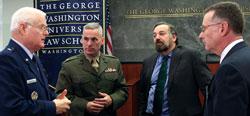
Panelists from the “Practitioners’
Views from Guantanamo” panel, from
left to right: Brig. Gen. Thomas Hemingway,
Office of Military Commissions; Col. Dwight
Sullivan, Office of Military Commissions;
Neil Lewis, New York Times Guantanamo correspondent;
and Professor Stephen Saltzburg
Abdul El-Tayef/WPPI
|

|
In October, The George Washington Law Review
hosted a symposium in celebration of its 75th
anniversary: “The New Face of Armed Conflict:
Enemy Combatants after Hamdan v. Rumsfeld.”
The event brought together key government and
military attorneys as well as prominent academics
in the fields of national security and international
law.
The symposium addressed many of the legal issues
America faces in the war on terror, focusing primarily
on the Supreme Court’s June 2006 decision
in Hamdan v. Rumsfeld. In that case,
the Supreme Court considered whether the military
commissions convened by President Bush upon Guantanamo
detainees violated either the Geneva Conventions
or the Uniform Code of Military Justice. Holding
that the military commissions were illegal because
they contravened both the Geneva Conventions and
the Uniform Code of Military Justice, the Court
declared the commissions unable to try Salim Hamdan
or any other enemy combatants captured during
the War on Terror.
In response to the Court’s decision in
the case, Congress passed the Military Commissions
Act of 2006; President Bush signed the act into
law on Oct. 17.

|
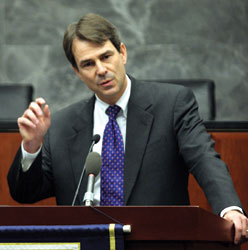
John B. Bellinger
III, legal adviser to the secretary of state,
discusses diplomatic repercussions of the
recent Military Commissions Act of 2006.
Abdul El-Tayef/WPPI
|
Five substantive panels and a keynote address
by John B. Bellinger III, the legal adviser to
the secretary of state, were the highlights of
the event. Bellinger discussed both the recent
passage of the Military Commissions Act and the
Supreme Court’s decision in Hamdan v. Rumsfeld
from the perspective of a diplomat wrestling with
the international effects of the United States’
Guantanamo policy.
The panels included scholarly discussions on
extraordinary rendition and ghost detainees, the
prospect of trying enemy combatants in the civilian
criminal courts, the Military Commissions Act
of 2006, and the continued viability of the Geneva
Conventions of 1949 in the war on terror. Each
of the papers presented will be published in the
summer 2007 issue of The George Washington
Law Review.
The symposium also included a presentation from
two lawyers intimately involved in litigating
the Hamdan v. Rumsfeld case, Professor
Neal K. Katyal of Georgetown University Law Center
and Gregory J. Katsas from the Department of Justice.
Numerous GW Law students and faculty members
planned and participated in the event, which was
among the academic highlights of the fall semester.
—Jefferey Bailey

Gore, Alito to visit
GW Law
Two heavyweights from the political and judicial
arenas, former Vice President Al Gore and Supreme
Court Associate Justice Samuel Alito, will visit
GW Law this spring.
On Feb. 1, Alito will judge the finals of this
academic year’s Van Vleck Constitutional
Law Moot Court Competition. Along with Judge Diane
Wood of the U.S. Court of Appeals for the 7th
Circuit and Judge Jose Cabranes U.S. Court of
Appeals for the 2nd Circuit, Alito will decide
which team will win the competition, which for
more than 50 years has been the highlight of GW
Law’s oral advocacy competitions. In the
fall, more than 120 students participated in preliminary
rounds, and four students will advance to the
finals to argue before the distinguished panel
of judges.
Van Vleck has a history of attracting famous
judges. Last year’s competition was judged
by Chief Justice of the United States John G.
Roberts Jr.
“This competition underscores every strength
that GW Law has to offer,” says David Johnson,
assistant dean for student affairs. “We
have a fantastic student body, one that can impress
the greatest legal minds of our generation. And,
we have a terrific faculty that has the knowledge
and connections to put together an event like
this year in and year out.”
On March 18, Gore will address the 17th Annual
National Association of Environmental Law Societies.
Increasingly, Gore has been recognized for his
dedication to environmental causes. His speech
will be one of the highlights of the four-day
conference hosted by GW Law.
The theme of this year’s program is “The
Future of Environmental Protection,” and
it will encompass a variety of contemporary topics
in environmental law, with specific focus on legal
issues relating to climate change.
“Vice President Gore’s address will
be a marvelous capstone to what should be a great
event for the entire community,” says Dean
Frederick M. Lawrence. “We are especially
proud of our Environmental Law Association students
who are already hard at work to make this an impressive
event and who are to be congratulated for their
efforts to obtain the bid to host this year’s
NAELS conference here at GW Law.”
—Dan Williams
|
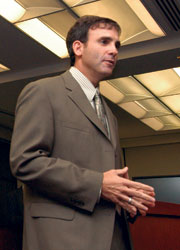
Professorial
lecturer Wayne Cohen, sponsor of the
Cohen & Cohen Mock Trial Competition
Claire Duggan
|
| |
|
Cohen & Cohen Mock Trial Competition
The best and brightest of GW Law competed
in the fourth annual Cohen & Cohen Mock
Trial competition on Nov. 9. A record-setting
number of teams entered the competition,
which was judged by Ricardo Urbina from
the United States District Court.
The competition is sponsored by Washington
personal injury firm Cohen & Cohen,
managed by associate professorial lecturer
Wayne Cohen and his wife, Jill.
“This is a great opportunity for
the students to compete and better their
trial skills,” Cohen says. The firm’s
$25,000 sponsorship will continue through
the 2007 competition. |
Law School Welcomes
New Admissions Dean
Anne Richard has joined the GW Law administration
as associate dean for admissions and financial
aid. Before entering higher education administration,
Richard was an associate and partner in the commercial
litigation section of a large Virginia firm. She
also worked as a trial attorney in the civil division
of the Department of Justice.
“I had a wonderful time practicing law,
but there came a time when I was ready for a change
and for new challenges,” Richard says. Following
her interest in higher education administration,
Richard served as associate dean and director
of admissions at George Mason University School
of Law before joining GW Law.
In her new position, Richard says one of the
Law School’s goals is to continue to recruit
outstanding students. Part of her plan is to provide
greater customer service and more individual attention
to each prospective student, applicant, and admitted
applicant.
Each year, the Law School receives about 10,000
applications from across the United States and
abroad. “Our applicant pools and the students
who ultimately choose to attend our law school
are extremely diverse—not only in terms
of race and ethnicity, but also in terms of age,
academic and professional backgrounds, geography,
et cetera,” Richard says.
She cites GW Law’s location in the heart
of Washington, well-known faculty, and the rigorous
curriculum as attractions for prospective students.
“There is a great deal of faculty-student
interaction,” Richard says. “Our students
also enjoy internship, networking, and employment
opportunities that are unsurpassed.”
To keep GW Law on the cutting edge of legal education,
Richard says the school will place a continued
focus on clinical and international programs.
—Stephanie Robichaux

Constitution Day
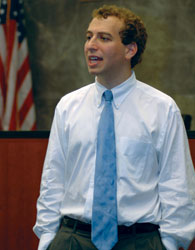
David Fontana
Jessica McConnell
|

|
Associate professor David Fontana delivered a
globally focused Constitution Day lecture in the
Burns Moot Court Room on Sept. 18, addressing
the historical importance of international cooperation
in the field of constitutional law. “Our
Global Constitution” explored the interconnectivity
between the written laws of nations in the past
and present.
Dean Frederick M. Lawrence says that Fontana,
a new faculty member, “has already begun
to establish himself as an important voice in
the scholarship of comparative constitutional
law.
“Questions of the role of international
law and foreign law in American jurisprudence
have never been more significant or timely,”
Lawrence says.
In his presentation, Fontana noted that, while
one might not see explicit references to other
nations in the Constitution, there is plenty of
evidence of their influence. He pointed out that
many of the Supreme Court’s most influential
decisions on topics including abortion, military
service, and diversity have had international
influence. Discussing the law with other nations
serves American interests, and it promotes international
cooperation, he said.
“Constantly, our courts and political leaders
have not hesitated to look at other countries
for constitutional guidance, even when they didn’t
have to,” Fontana said. “This has
served us well.”
While Fontana’s attention to this topic
stems from his interest in law and global policy,
he suggested that students from all interest areas
may benefit from critical thinking about this
subject, with the end goal of becoming global
citizens.

The Law of the Sea
in the Twenty-First Century:
A Symposium in Remembrance of Louis B. Sohn
A voice of reason and source of wisdom”
is how United Nations Secretary-General Kofi Annan
remembers Louis B. Sohn, a prolific international
law scholar who helped draft the U.N. charter
and who fostered awareness and action in human
rights.
Members of the GW Law community remember Sohn
for his many contributions to the school as well
as his dedication to modern international law,
a discipline he helped define and establish. His
attention to international law spanned all aspects
of the discipline, including international organizations,
international human rights, international environmental
law, use of force, state responsibility, international
law of the sea, and international dispute resolution.
This fall, the Law School paid tribute to Sohn
through “The Law of the Sea in the Twenty-First
Century: A Symposium in Remembrance of Louis B.
Sohn.” Many GW Law students and faculty
members met with alumni and guest speakers in
fields related to Sohn’s work during the
event, held on Oct. 24. Attendees included Lobingier
Professor Emeritus of Comparative Law and Jurisprudence
Thomas Buergenthal of the International Court
of Justice.

|
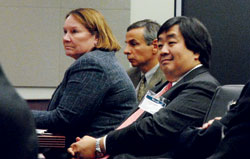
(Left to right) Professor
Dinah Shelton; Stanimir Alexandrov, LLM
’92, SJD ’94; and Yale Law School
Dean Harold Koh
|
Sohn’s dedication to the law extended to
legal education. He trained many students, including
contemporary leaders and thinkers in international
law. His teaching, while thorough and intense,
was done with great care.
With degrees in law and science from John Casimir
University in hand, Sohn arrived in the United
States shortly before the Nazi invasion of his
native Poland. After furthering his education
at Harvard Law School with the assistance of its
late dean James M. Landis, Sohn went on to help
pave the way for the formation of the Charter
of the United Nations, attending the San Francisco
Conference in 1945. In addition to teaching at
several acclaimed institutions including GW Law,
as well as his extensive writing and research,
Sohn was instrumental in shaping the U.S. draft
of the treaty on general and complete disarmament,
the U.S. Arms Control and Disarmament Agency,
the 1972 Stockholm Conference on the Human Environment,
and the U.N. Convention on the Law of the Sea.
Sounding
Off
Alumnus celebrates 30 years as voice of
Colonials basketball
|
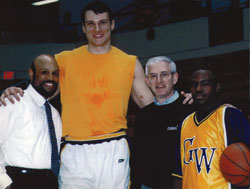
(Left to
right) Mike Jarvis, Alexander Koul,
Phil Hochberg, and Shawnta Rogers
Claire Duggan
|
Phil Hochberg, BL ’65, is well known
to the Washington community as the voice
of GW men’s basketball—a role
he’s held since the 1970s. His voice
is heard all over the area, announcing for
the Senators, Baltimore Orioles, University
of Maryland and American University basketball,
and—for nearly four decades—the
Washington Redskins.
Hochberg also has been the official announcer
at seven presidential inaugural parades.
But out of all the big gigs, cheering on
the Colonials is his favorite.
“There’s a personal identification
with GW and a personal pride in terms of
its success given that I am an active alumnus
of the Law School,” Hochberg says.
The 2006-07 season marks Hochberg’s
30th year with the Colonials. He says it’s
been a “wonderful experience”
keeping fans on top of the action at the
Charles E. Smith Athletic Center. He understands
the announcer is unseen by most spectators,
but notes that his is an important role
in the Colonials experience.
Of the hundreds of GW games he’s
covered, Hochberg pinpoints two as most
memorable: The Colonials’ 78-75 victory
over top-ranked Massachusetts in 1995 with
President Clinton in attendance; and the
86-85 overtime win over UNC-Charlotte that
was the highlight of last season. And he’ll
never forget the game in 1986 when an inability
to adjust to his first pair of bifocals
caused his head to bob up and down, triggering
a puzzled look on his face that prompted
a referee to stop the action.
In the legal court, Hochberg has a solo
practice and serves as special counsel to
Shulman, Rogers, Gandal, Pordy & Ecker
in Rockville, Md., after serving Washington
firms for 35 years. He represents the NFL,
NBA, NHL, NASCAR, PGA Tour, and other sports
interests in legislative and regulatory
matters, and has been fortunate to “combine
a vocation with an avocation,” as
he puts it. Along with fellow GW Law alumnus
and former Redskins quarterback Eddie Lebaron,
Hochberg is honored in the Ring of Fame
that encircles FedExField.
—Michael Richman |

Professor Renee Lettow
Lerner meets with French Minister
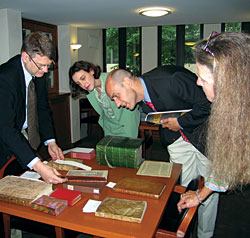
Associate Dean Scott Pagel, professor Renee
Lettow Lerner, Alexis Francois Charles Bouroz,
and Jennie Meade, rare books librarian of
the Jacob Burns Law Library, tour the library
in June.
Claire Duggan
|

|
In June, professor Renee Lettow Lerner met with
Alexis Francois Charles Bouroz, deputy director
for internships at the National School for Magistrates,
Bordeaux, for a discussion on American law and
issues of international comparative law. Bouroz’s
visit included a tour of the Jacob Burns Law Library
and the library’s French Collection hosted
by Associate Dean Scott B. Pagel and Jacob Burns
Law Library rare books librarian Jennie Meade.
The visit was part of the International Visitor
Leadership Program, organized by the Phelps Stokes
Fund on behalf of the Department of State. Bouroz’s
time at GW Law was one of the stops on his D.C.
tour that included similar meetings at the Supreme
Court and the Department of Justice in an effort
to gain a better understanding of the American
legal system and judicial process, selection and
training process of judges, legal practices regarding
illegal immigration, human trafficking, juvenile
justice, and the environment.

Student Conference
Center Opens
GW Law enjoys improvements to its physical complex

|
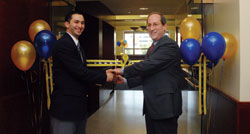
SBA President Sam
Jammal and Dean Frederick M. Lawrence cut
the ribbon to the new Student Conference
Center, located on the second floor of Lisner
Hall.
Claire
Duggan
|
The beautifully appointed Student Conference
Center officially opened in September, giving
GW Law students a new modern, multi-purpose space
in which to study, collaborate, and socialize.
Dean Frederick M. Lawrence and SBA President Sam
Jammal cut the ribbon to the space, welcoming
students, faculty, and staff members.
The SCC is located on the second floor of Lisner
Hall, the latest building along the University
Yard to join the Law School complex. Its cherry
wood walls, glass interior doors, and adaptable
furnishings are similar to design elements seen
throughout the complex, further unifying the look
and feel of the complex. The space is bright and
welcoming, with views across the yard from multiple
large windows.
“Our goal was to create an environment
that further encourages a horizontal flow across
our physical space so that community members not
only plan to meet together, but regularly see
each other on a more casual basis,” Lawrence
says.
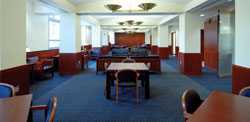
The new Student Conference Center offers
students a beautiful new place in which
to study, collaborate, and socialize. It
is among several improvements to the Law
School’s physical complex, including
a new food and beverage vendor and updated
furniture and computer hardware.
Claire Duggan
|

|
Senior Associate Dean Tom Morrison notes that
“conference center” is just one of
the uses for which the multi-purpose SCC will
be used. Morrison says there are spaces that could
serve as a classroom, a breakout room, and a location
for event registration and refreshments. Another
draw will be the opening of the Uptowner Cafe,
a food and beverage vendor that will open on the
first floor of Lisner later this year.
Additional physical improvements to the law complex
greeted new and returning students this fall.
Student study and breakout rooms on the first,
second, and fourth floors of Stuart Hall (where
the building adjoins Lisner) were also added.
New lounge furniture was placed on the third and
fourth floors of Stuart and fourth floor of Lisner.
Computer labs on the second floor of Burns and
Stuart were upgraded with new hardware and furniture.
Soon, a spacious study area with new furniture,
study tables, and lighting will occupy the area
of the former computer lab on the second floor
of Stockton.
Whether studying or socializing, GW Law students
now experience a higher level of comfort and convenience
on campus than ever before.

SCRAP Team Shares Stories
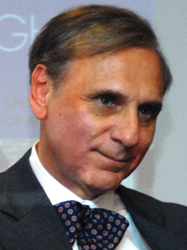
Neil Thomas Proto, MA ’69, JD ’72
Claire Dugan
|

|
Alumni and professors reunited at GW Law in September
to tell the story of how law students challenged
the federal government and the nation’s
railroads in the early ’70s—taking
the corporate wrongdoing and environmental case
all the way to the U.S. Supreme Court.
United States of America v. Students Challenging
Regulatory Agency Procedures is chronicled
in To a High Court by Neil Thomas Proto,
MA ’69, JD ’72. The book’s real-life
cast of characters told current students about
the hard work and humor of the time-consuming
but rewarding project.
Joining Proto on the panel were George Biondi,
JD ’73; John Larouche, JD ’73; and
Peter Resslar, JD ’72; as well as professor
Peter Meyers, who argued the case to the Supreme
Court as a GW Law legal assistant. Kenneth Perlman,
JD ’72, the fifth student member of SCRAP,
was unable to attend the event.
“This project taught me a lot of things
I still use in my everyday lawyering,” Biondi
said. “I learned it’s always better
if you function as a team and to never be fearful
or intimidated. You must always sweat the details
and know your case well as that’s the only
way to be a good lawyer to your client.”
The group spoke of the impact and guidance of
professors John Banzhaf and Arnold Reitze, whose
unfair trade practices course and environmental
law class sparked the creation of SCRAP and the
lawsuit.
Professor Joshua Schwartz, Georgetown professor
Richard Lazarus, and Barbara McDowell of D.C.
Legal Aid also spoke at the event and provided
insight into SCRAP and its legal implications.
“These students stunned the railroad industry,”
Lazarus said. “And 30 years later, it’s
still a watermark case.”
—Claire Duggan
|